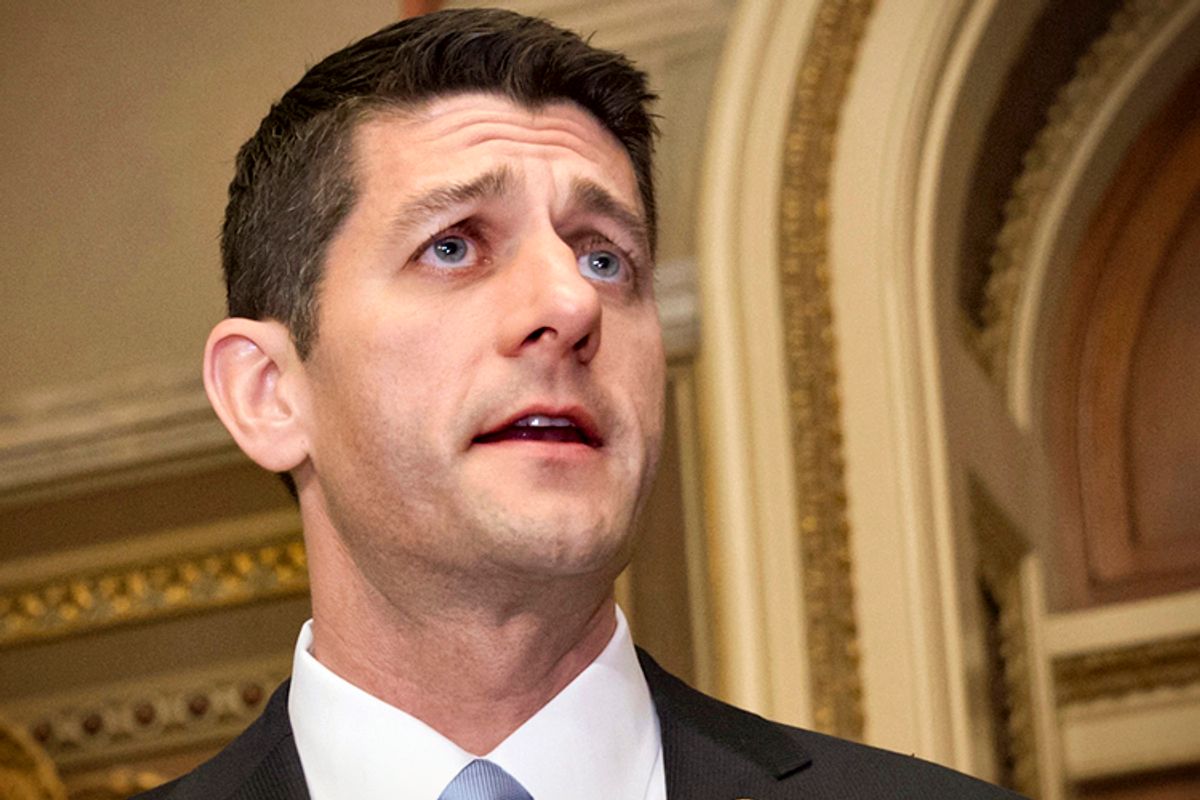The usual Republican mania about tax cuts as the answer to every problem facing Planet Earth has been tamped down this cycle. Not that Republicans don't *believe* that anymore; it's just that right now, lines about ISIS terrorists crossing the Mexican border to infect patriotic senior citizens with Ebola are proving more effective.
But there may also be a recognition in Republican quarters that the old "tax cuts for the rich as worldly cure-all" rhetoric isn't doing the party a whole lot of favors. "We have to stop being one-trick ponies," Rep. John Campbell told Politico for a recent piece about the shift in emphasis. The GOP, instead, is talking up the more benign-sounding "tax reform" as its new preference. It's not just about slashing the top income tax rate anymore, they're saying. As Sen. Lindsey Graham told Politico, "The era of tax reform and overhauling the Tax Code is replacing [an emphasis on] numbers.... A flatter tax with less deductions is the new mantra."
Tax reform is a very hard thing to do. The idea, as Graham says, is that you can compress tax brackets (i.e., lower top tax rates) without increasing deficits by eliminating, or tightening, large tax deductions. The problem is that many of those deductions happen to be extraordinarily popular with voters. Two of the juiciest ones are the tax exemption for employer-sponsored health insurance and the mortgage interest tax deduction. There's a lot of money to be saved by eliminating or reducing those. Getting rid of either wouldn't be a bad idea in and of itself, but it would be horribly unpopular. (Also, the idea that you can just "get rid" of something like the tax exemption for employer-sponsored health care, and be done with it, is a fantasy. The U.S. health care financing system, in which most people get their health insurance through an employer, is founded on that tax exemption. Eliminating that exemption would disrupt the American health care sector much more profoundly than Obamacare could ever dream of doing. Again, not necessarily a terrible thing, but something worth thinking about/planning for! Anyway.)
So if you want to do serious, revenue-neutral "tax reform," but politics scare you away from taking on the biggest deductions, what do you do? Republican supply-siders have the perfect answer, in one of those hilarious Washington phrases that never quite goes away: "dynamic scoring."
In the next Congress, Rep. Paul Ryan will most likely take over as chairman of the tax-writing Ways and Means Committee. Paul Ryan is interested in pursuing revenue-neutral tax reform. The way the CBO and Joint Taxation Committee currently "score," or forecast the effect of a proposed tax policy change, is called "static" scoring: If you cut a top tax rate, the score will show tax revenue falling accordingly. Ryan wants to change the CBO and JCT's method to "dynamic" scoring to better incorporate supply-siders' assumptions: If you cut a top tax rate, the economy will grow like wildfire as wealth trickles down, creating a larger tax base, leaving the government with no lost revenue.
A new math for tax policy is attracting fresh attention in Washington as polls suggest that Republicans could capture full control of the U.S. Congress next month.
Known as "dynamic scoring," the approach is about how to estimate the federal budget impact of tax law changes and it has long been backed by Republicans but opposed by some Democrats.
In recent remarks to a financial industry group, Representative Paul Ryan said that if his fellow Republicans can seize control of Congress in the Nov. 4 elections, they could make dynamic scoring a more integral part of tax analysis.
"What we want to do is change our measurement so that we can use - people say it's dynamic scoring - I really prefer to call it reality-based scoring," said Ryan, favored to become chairman of the House of Representatives' tax-writing committee in the new Congress that will convene in January.
You can feed back some minor, completely uncontroversial assumptions in tax policy scoring. What you cannot incorporate is the, shall we say, "dubious" belief that cutting top tax rates will spur the economy to grow at a fantastic pace, offsetting any deficits that a reduction in top tax rates would incur. You cannot use "dynamic scoring" to fill any inconvenient gaps that math poses to your ideology.
You've probably heard more about "tax reform" instead of "tax cuts for the wealthy" this election cycle, and you'll hear it again if Republicans take both chambers of Congress and try to push a far-right tax reform plan. But if Republicans try to push "dynamic scoring" onto the non-partisan budget forecasters, the budget forecasters will no longer be non-partisan, and the "tax reform" they'll be presented with will be nothing other than deficit-widening tax cuts for the wealthy.

Shares